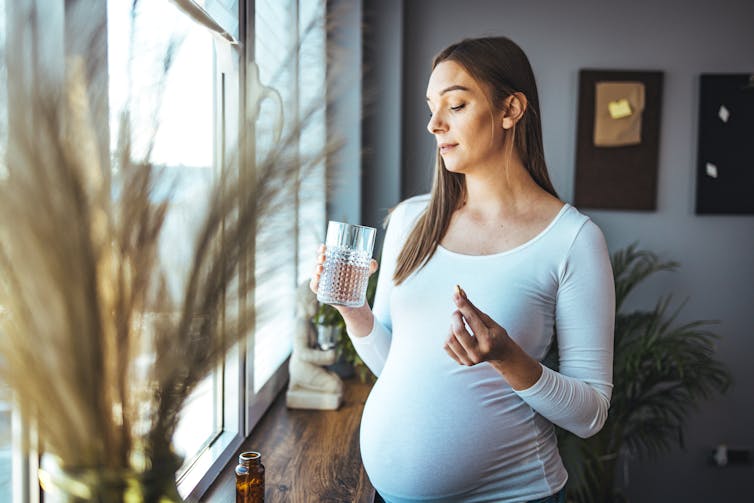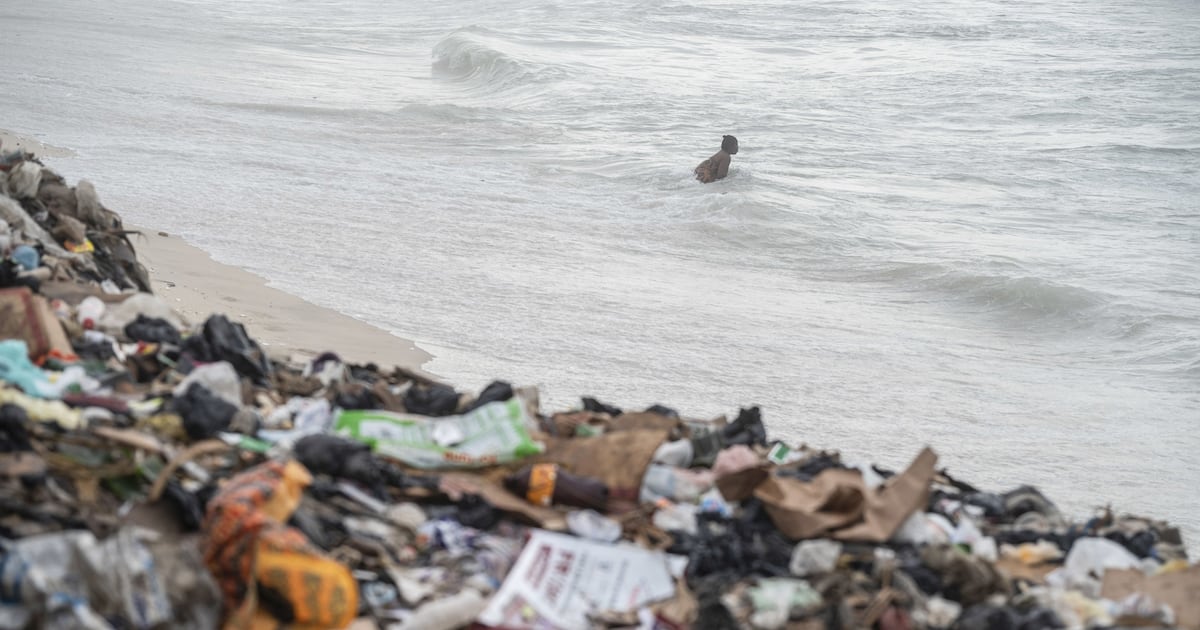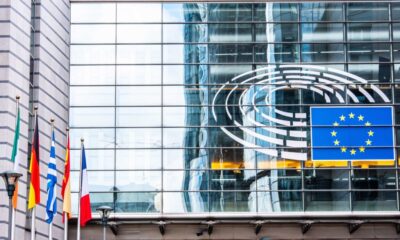Opinion
Sinéad O’Sullivan: Fee of $100,000 for H-1B visas is a crack in the system that made Ireland flourish

Read more on post.
Last week, US president Donald Trump announced that new H-1B visa applications, the main route for high-skilled foreigners into the US, will now come with a tidy $100,000 price tag. An entry fee, if you like, to the land of the free and the home of the global economy’s growth engine Silicon Valley.
While Americans are good at charging for things that used to be free, the $100,000 price hike to hire an engineer is bold, even by their standards. The White House says this is to protect American jobs, but that’s where the story starts to wobble.
H-1B visas aren’t for fruit pickers or hotel cleaners. Instead, they’re overwhelmingly used for software engineers, data scientists, chip designers, medical researchers. Every Irish person I met teaching at Harvard and MIT was there on a H-1B. Around 70 per cent of H-1B recipients work in computer-related occupations, with the rest concentrated in biotech, medicine and engineering. In other words: the exact sectors the US insists are vital for national competitiveness.
Claiming that a $100,000 fee will “protect American jobs” is like claiming a toll on motorways will inspire more people to become civil engineers. Even Trump’s frenemy Elon Musk pointed out that Tesla and SpaceX depend on immigrant engineers. He knows that Silicon Valley is full of Sergey Brins and Sundar Pichais – immigrants who didn’t displace American workers but created whole industries.
And yet the policy stands. Which tells us this isn’t about jobs at all.
Enter Stephen Miller, the White House deputy chief of staff for policy.
To understand the new H-1B regime, you have to understand him, not as a mere nodding head, but as one of the Trump movement’s ideologues-in-chief. Miller has always operated from a worldview in which immigration, of any form, corrodes the nation. In his writings and leaked memos, he does not parse immigration by categories such as refugee, asylum seeker, skilled worker. Ideologically, it is all one undifferentiated threat: a dilution of cultural sovereignty, a weakening of demographic control and, ultimately, a contamination of what he frames as American purity.
This is why the $100,000 fee isn’t designed to make economic sense, but to harden a border wall of policy.
In Miller’s ideological architecture, immigration policy is not a lever of competitiveness but a litmus test of loyalty. Economics – GDP growth, innovation, productivity – are secondary, almost irrelevant. Project 2025, the thousand-page blueprint he helped engineer, makes this explicit: the United States should seek self-sufficiency, walling off flows of labour and talent as ruthlessly as it walls off its southern border. This is autarky dressed as nationalism, and it elevates exclusion above any pragmatic calculation.
[ Trump’s H-1B visa fee prompts emergency guidance from companiesOpens in new window ]
That’s why, when Elon Musk heavily protested H1-B reform, his protests went nowhere. Musk, who has never been shy about theatrics, tweeted in December, while being inside the Trump camp: “The reason I’m in America along with so many critical people who built SpaceX, Tesla and hundreds of other companies that made America strong is because of H1B. … Take a big step back and F*** YOURSELF in the face. I will go to war on this issue the likes of which you cannot possibly comprehend.”
If even the world’s richest man, an immigrant himself whose companies depend on armies of foreign engineers, cannot sway the administration, it tells us something fundamental: this isn’t about jobs, economics or even Silicon Valley, once America’s golden goose. When Miller’s creed collides with Musk’s capitalist mandate, the most opaque fringe ideology wins.
And that is the intellectual core of the Trump administration’s immigration doctrine: better to hollow out the innovation economy than allow foreign talent to refresh it. Better to shrink America than for Americanism to be “diluted”. It is the politics of purity, not prosperity.
So here’s the rub from an Irish perspective: Ireland has always thrived on the US’s openness. Our students go there, learn, and come back. Our companies expanded there, plugged into networks, and return with capital. Our multinationals rely on people and ideas flowing across the Atlantic.
If that flow slows; if Irish graduates can’t afford to go, if American firms can’t afford to bring them in, then the whole informal exchange system we’ve built over decades begins to crack. The US is doing more than pricing out talent. It’s dismantling the shared operating system that made countries like Ireland flourish.
So yes, the US is now charging $100,000 to let in an engineer. You can roll your eyes at the absurdity, but don’t miss the punchline: there isn’t one. The joke is that this is deadly serious. It’s not about protecting jobs. It’s about locking the doors. And when even Elon Musk can’t get them reopened, we should take the hint.
Ireland’s relationship with the US was built on the idea that ambition could flow both ways across the Atlantic. Trump’s America is telling us that era is over. The question now isn’t how much a visa costs; it’s whether the door is still open at all.
Sinéad O’Sullivan formerly led the Institute for Strategy and Competitiveness at Harvard Business School
Opinion
Paracetamol use during pregnancy not linked to autism, our study of 2.5 million children shows
Read more on post.
United States President Donald Trump recently claimed that using the common painkiller acetaminophen (also known as paracetamol and by the brand name Tylenol in the US) during pregnancy is fuelling the rise in autism diagnoses. He then went on to suggest pregnant women should “tough it out” rather than use the common painkiller if they experience fever or pain.
This announcement has caused alarm and confusion worldwide. But despite Trump’s claim, there is no strong scientific evidence to back it up. Our study of nearly 2.5 million births in Sweden published in 2024 shows no evidence that acetaminophen use during pregnancy increases a child’s risk of autism. This is the largest study conducted on the subject to date.
To understand whether acetaminophen really poses a risk in pregnancy, we turned to Sweden’s national health registers, which are among the most comprehensive in the world. Our study followed nearly 2.5 million children born between 1995 and 2019, tracking them for up to 26 years.
Using prescription records and interviews that midwives conducted during prenatal visits, we could see which mothers reported using acetaminophen (about 7.5% of pregnancies) and which did not.
We also made sure to account for any variables that may have affected the results of our statistical analysis – including controlling for health factors, such as fever or pain, which would have influenced whether or not a mother used acetaminophen during her pregnancy. This was to ensure a more fair comparison between the two groups.
We then looked at the children’s neurodevelopmental outcomes – specifically whether they were diagnosed with autism, ADHD or an intellectual disability.
The real strength of our study came from being able to compare siblings. This allowed us to compare children born to the same mother, where acetaminophen had been used during one child’s pregnancy but not the other. We compared over 45,000 sibling pairs, where at least one sibling had an autism diagnosis.
This sibling design is powerful because siblings share much of their genetics and family environment. This allows us to tease apart whether the drug itself – rather than underlying family traits or health conditions – is responsible for any apparent risks for neurodevelopmental outcomes.
Acetaminophen use
When we first looked at the entire population, we saw a pattern that echoed earlier studies: children whose mothers reported using acetaminophen during pregnancy were slightly more likely to be diagnosed with autism, ADHD or an intellectual disability.
But once we ran the sibling comparisons, that association completely disappeared. In other words, when we compared sets of siblings where one was exposed in the womb to acetaminophen and one was not, there was no difference in their likelihood of later being diagnosed with autism, ADHD or an intellectual disability.

Dragana Gordic/ Shutterstock
Our study is not the only one to put this question to the test. Researchers in Japan recently published a study using a similar sibling-comparison design, and their results closely matched ours.
Importantly, they replicated our findings in a population with a different genetic background and where patterns of acetaminophen use during pregnancy are quite different. Nearly 40% of mothers in Japan reported using the drug during pregnancy. In comparison, less than 10% of Swedish mothers had used it.
Despite these differences, the conclusion was the same. When siblings are compared, there is no evidence that acetaminophen use during pregnancy increases the risk of autism or ADHD.
These findings mark an important shift from earlier studies, which relied on more limited data, used smaller cohorts and didn’t account for genetic differences. They also did not fully account for why some mothers used pain relief during pregnancy while others didn’t.
For example, mothers who take acetaminophen are more likely to also have migraines, chronic pain, fever or serious infections. These are conditions that are themselves genetically linked to autism or ADHD, as well as a child’s likelihood of later being diagnosed with one of these conditions.
These types of “confounding factors” can create associations that look convincing on the surface, but may not reflect a true cause-and-effect relationship.
That brings us to the real question on many people’s minds: what does this mean if you’re pregnant and dealing with pain or fever?
It’s important to recognise that untreated illness during pregnancy can be dangerous. A high fever in pregnancy, for example, is known to increase the risk of complications for both mother and baby. “Toughing it out,” as the president suggested, is not a risk-free option.
That’s why professional medical organisations such as the American College of Obstetricians and Gynecologists and the UK’s Medicines and Healthcare products Regulatory Agency continue to recommend acetaminophen (paracetamol) as the safest fever reducer and pain reliever during pregnancy when used at the lowest effective dose and only when necessary. This has been the guidance for decades.
Read more:
Paracetamol, pregnancy and autism: what the science really shows
Of course, if someone finds themselves needing to take acetaminophen regularly over a longer period of time, that’s a decision best made in consultation with their doctor or midwife. But the idea that acetaminophen use during pregnancy causes autism simply isn’t supported by the best available science.
The greater danger is that alarmist messaging will discourage pregnant women from treating pain or fever – putting both themselves and their babies at risk.
Opinion
The Irish Times view on presidential nominations: Too narrow a field

Read more on post.
Only a few days ago, it still seemed possible that voters would have a choice of up to six candidates in next month’s presidential election. But when nominations closed at noon on Wednesday, only three names had made it on to the ballot paper. That reflected the narrowing that had taken place over the previous four days.
First, Sinn Féin announced that it would be supporting Catherine Connolly rather than putting forward a candidate of its own. That was followed by businessman Gareth Sheridan’s failure to secure the requisite support from local authorities.
There was a flurry of excitement in the final hours before nominations closed, as Maria Steen edged ever closer to the 20 signatures from members of the Oireachtas which the Constitution requires. But the conservative campaigner ultimately fell two names short.
As a result, the electorate now finds itself presented with the smallest field of candidates since the presidential election of 1990.
That is regrettable. A broader, more varied choice would surely have led to a more vigorous and wide-ranging debate, which in turn would have stimulated public interest and potentially increased voter turnout.
Steen’s supporters have been quick to blame her failure to secure a nomination on the main political parties, whom they accuse of shutting down democratic choice.
The charge is unfounded; between them, Connolly, Jim Gavin and Heather Humphreys command the support of nearly every party in the Oireachtas – almost 85 per cent of its members. The suggestion that parties with candidates in the field should ease the path of potential opponents reached absurd levels on Tuesday when it was suggested that Connolly herself might sign Steen’s nomination papers.
It should not shock anyone that political parties pursue their own electoral advantage in order to achieve the objectives they were set out up to accomplish. That, after all, is the proposition they presented to their voters.
Where Ireland differs from most of its international counterparts is in the number of Independents it elects. As a result, there were more than enough Independent TDs and Senators available to ensure Steen’s nomination. They chose not to do so, presumably for a variety of different reasons. That is why she did not succeed.
The fact that she came so close is largely due to the efforts of Peadar Tóibín, leader of Aontú, one of the smallest parties in the Oireachtas. In the end, he fell short, in part because the campaign itself began too late and ran out of time.
But there are lessons here for those who believe Irish political discourse is too narrow and that some voices are excluded. The remedy to that lies not in the kindness of opponents but in effective, organised and sustained political work.
Opinion
The Irish Times view on textile waste: what a load of rubbish

Read more on post.
Ireland is the second largest producer of textile waste per head in Europe, second only to Belgium. We each consume 53kg of textiles each year – more than double the European average. To put the figure in context, a T-shirt weighs between 100 and 250 grams, and a winter duvet can weigh 3 kg.
It’s a lot of clothes, bedding and curtains to throw out and most of it goes in the bin, with only a third being recycled via clothes banks and charity shops. Given the dubious distinction of being one of the worst offenders when it comes to textile waste you might assume that we would quickly and wholeheartedly embrace new rules to reduce textile waste adopted by the European Parliament earlier this month.
Under the new directive, producers who make textiles available in the EU will have to cover the cost of their collection, sorting and recycling. The rules will apply to all producers, including online sellers, irrespective of whether they are established in an EU country or outside it.
The measures will be implemented through a producer responsibility scheme similar to the Re-turn system for drink bottles and cans set up by packaging and drinks companies.
Member states have 30 months from the directive’s entry into force to establish a scheme. There is, of course, no reason why it cannot be done sooner and every reason why it should be.
But if the Re-turn scheme is any guide, the Government will be in no rush when it finds itself caught between industry lobbying and fears the measure may push up prices.
The Single Use Plastic directive came into effect in 2019 but the Irish deposit-based scheme for recycling drink bottles and cans launched in February 2024. Many other European countries brought them in 20 years ago.
Despite initial teething problems, the Re-turn scheme has been supported by the public and has helped the industry meet its EU-mandated recycling targets. There is no reason to believe consumers will not support a textile recycling scheme sooner rather than later.
-
Culture2 days ago
Taylor Swift’s new cinema outing generates more than €12million in just 24 hours
-
Politics2 days ago
European Parliament snubs Orbán with vote to shield Italian MEP from Hungarian arrest
-
Culture1 day ago
Milan Fashion Week 2025: Unmissable shows and Giorgio Armani in mind
-
Opinion2 days ago
Fintan O’Toole: How can you live with the knowledge that you have facilitated mass murder?
-
Health2 days ago
EU renews support for WHO’s Universal Health Coverage Partnership
-
Opinion2 days ago
AI Is Pointless If It Doesn’t Boost Productivity
-
Business17 hours ago
Households to be offered energy bill changes, but unlikely to lead to savings
-
Culture3 days ago
Marvel stars Mark Ruffalo and Pedro Pascal stand up for Jimmy Kimmel as Disney boycott intensifies
















































